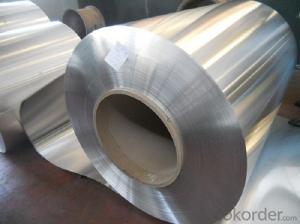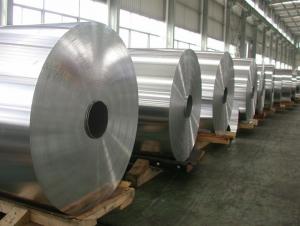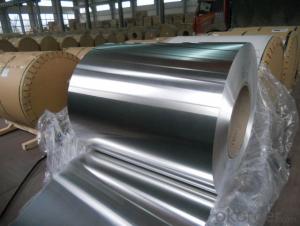Corrosion Inspection 5052 H32 Aluminium Gutter Coil
- Loading Port:
- Shanghai
- Payment Terms:
- TT OR LC
- Min Order Qty:
- 2.5
- Supply Capability:
- 5000 m.t./month
OKorder Service Pledge
OKorder Financial Service
You Might Also Like
Item specifice
Corrosion Inspection 5052 H32 Aluminium Gutter Coil
l Product Introduction
Aluminium Coil is widely used in manufacturing aluminum thin sheet and aluminum foil. It is suitable for further machining with original standard quality. It is easy to be controlled and be manufactured to according to requirements.
l Product Specification
| Main Specification | ||||||||
| Alloy | AA1xxx (AA1050, AA1060, AA1070, AA1100 etc.) | |||||||
| AA3xxx (AA3003, AA3004, AA3005, AA3105 etc.) | ||||||||
| AA5xxx, AA6XXX (AA5052,AA5083, AA5754, AA6061, AA6062 etc.) | ||||||||
| AA8xxx(AA8011, AA8006 etc.) | ||||||||
| Temper | H14,H16, H18, H22, H24, H26, H32,O/F, T4, T6, T651 | |||||||
| Thickmess | 0.01mm-100mm | |||||||
| Width | 30mm-1700mm | |||||||
| Standard | GB/T 3880-2006/ASTM | |||||||
| Special specification is available on customer's requirement | ||||||||
l Packaging & Delivery
Packaging detail: Standard seaworthy exporting carton, Wooden pallets, waterproof paper and plastic coverage or as customer's requirements
Delivery detail: about 25 days from received oiginal L/C or advanced payment
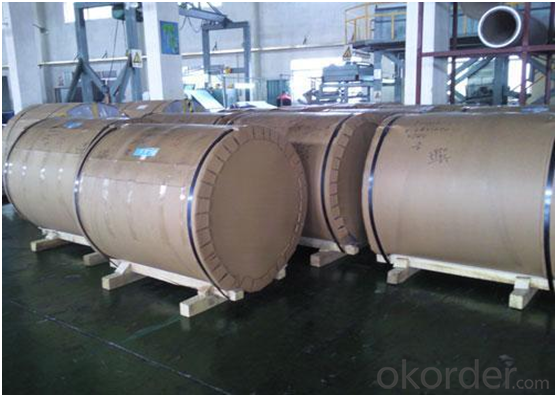
l Company Profile
CNBM International Corporation, China National Building Materials (Group) Corporation, is one of the largest companies in China building material & equipment industry, with 42,800 employees and sales in 2005 of US Dollar 4.395 billion. In 2006, China National Building Material Company Limited was listed on Hong Kong Stock Market with the stock code as 3323.
Aluminium coil is one of the popular product in the market of CNBM. With advanced technology and equipment, CNBM has sold its hight quality color coated aluminium coil to the world.
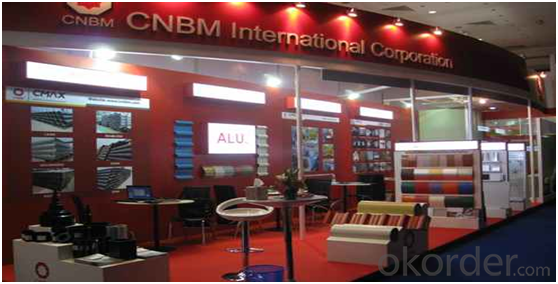
l CNBM World Wide
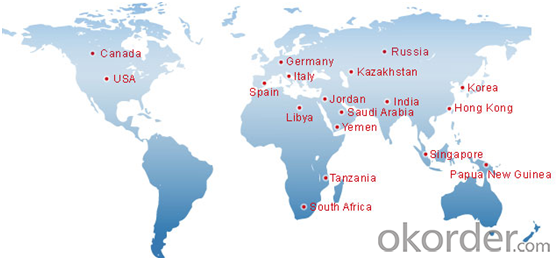
l Product Images
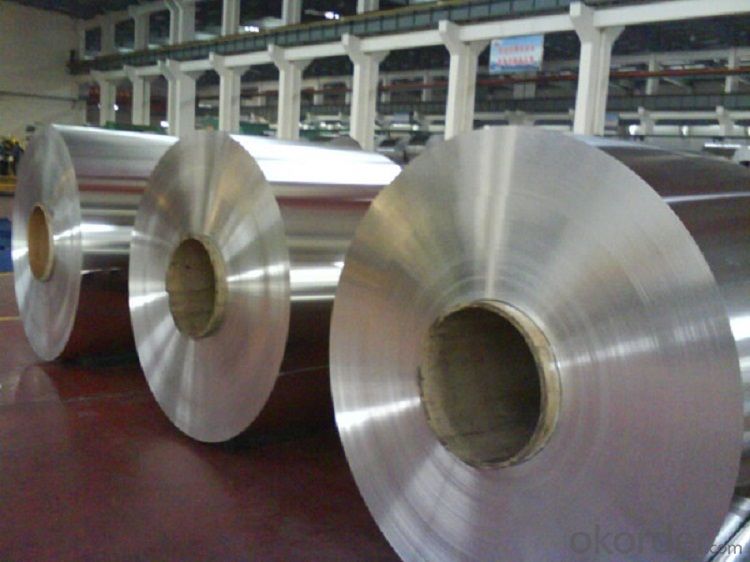
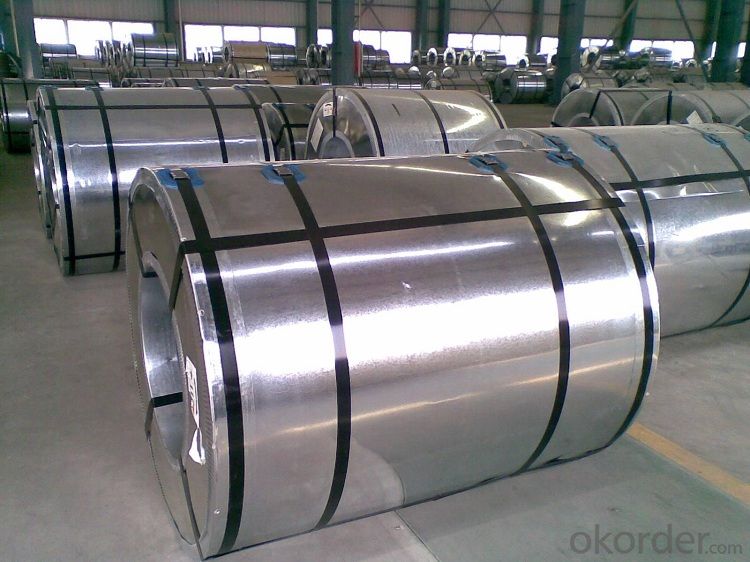
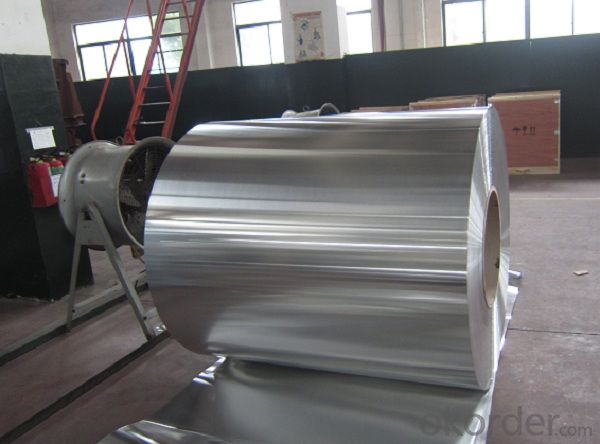
l Certificates
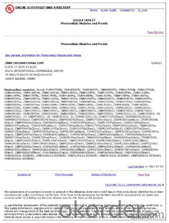
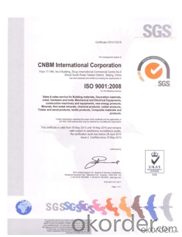
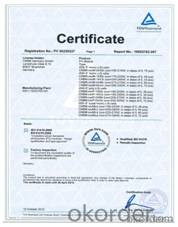
l FAQ
Q: Do you provide free samples?
A: Yes, free samples will be sent to you on freight at destination.
Q: Can I get your latest products catalogue?
A: Yes, it will be sent to you in no time.
Q: What is the MOQ?
A: 2.5 tons
Q: What are your payment terms?
A: We accept L/C, T/T.
- Q:What is the typical density of aluminum coils?
- The typical density of aluminum coils can vary depending on the specific alloy and the manufacturing process used. However, in general, the density of aluminum coils is typically around 2.7 grams per cubic centimeter (g/cm³). This value is slightly less than that of pure aluminum, which has a density of 2.7-2.8 g/cm³. It is important to note that the density of aluminum coils can also be influenced by factors such as the thickness of the coil and any additional coatings or treatments applied to the surface.
- Q:How are aluminum coils used in the production of gutters and downspouts?
- The production of gutters and downspouts relies heavily on aluminum coils. These coils serve as the main material for manufacturing seamless gutters, which are renowned for their durability, longevity, and aesthetic appeal. To initiate the production process, specialized gutter machines are utilized to feed the aluminum coils. These machines shape the coils into the desired gutter profile, usually in the form of a lengthy continuous piece. Subsequently, the coil is cut into appropriate lengths that correspond to the measurements required for a specific building or project's gutter system. Once cut, the aluminum coil undergoes various bending and folding techniques to shape and form it. This transformation allows the coil to assume the seamless gutter shape necessary for efficiently collecting and channeling rainwater away from a building's roof and foundation. The seamless design eliminates the risk of leaks and enhances the overall functionality of the gutter system. Moreover, the aluminum coils used in gutter production offer several advantages. Firstly, aluminum is lightweight yet sturdy, making it an ideal material for gutters and downspouts. It possesses resistance to rust and corrosion, ensuring the longevity of the gutter system even in harsh weather conditions. Additionally, aluminum is highly malleable, enabling customization of shapes and sizes to meet the specific requirements of different buildings. In conclusion, aluminum coils play an integral role in the production of aesthetically pleasing, durable, and highly functional gutters and downspouts. Their use as the primary material guarantees long-lasting performance, resistance to corrosion, and customization options to cater to various architectural needs.
- Q:What is the cost of aluminum coils compared to other metals?
- The price of aluminum coils can change depending on various factors such as market demand, availability, and current economic conditions when compared to other metals. Generally, aluminum is considered to be more affordable in comparison to metals like copper or stainless steel. Due to its lightweight, resistance to corrosion, and excellent thermal conductivity, aluminum is extensively used in different industries. It is the preferred choice for applications in construction, automotive, aerospace, and electrical industries. When compared to copper, aluminum typically has a lower cost per pound. However, it is important to note that copper is highly regarded for its superior electrical conductivity and is often favored in specific applications where electrical performance is crucial. In contrast, stainless steel is generally pricier than aluminum. Stainless steel provides exceptional resistance to corrosion and durability, making it suitable for applications that require high strength and the ability to withstand harsh environments. In conclusion, when considering the cost of aluminum coils in relation to other metals, aluminum is frequently a more cost-effective option. Nevertheless, it is crucial to evaluate the specific requirements and performance characteristics needed for a particular application in order to determine the most suitable metal choice.
- Q:How are aluminum coils protected against chemical exposure?
- Aluminum coils are protected against chemical exposure through the application of corrosion-resistant coatings or anodizing processes. These protective measures create a barrier between the aluminum surface and the chemicals, preventing direct contact and minimizing the risk of corrosion or degradation.
- Q:Today at my school I was messing with this sketch thingy, the one with 2 knobs to twist up or down to draw, my friend decided to break it and when we broke it, this silver dust called aluminum powder got on my hands, I never knew it was dangerous cause your see, we never read the manual we just found it. About 3 minutes later he pointed to my hand and I saw blood. It kinda stung.
- The aluminum powder found in an Etch-a-Sketch will not cut you, it's much too small. In fact it's so small you could only see it's edges under a high powered microscope. The cut was most likely caused by jagged glass/plastic when you broke the Etch-a-Sketch open. It's not unusual to cut yourself and not realize until someone else sees you're bleeding.
- Q:Can aluminum coils be used in the production of aluminum sandwich panels?
- Yes, aluminum coils can be used in the production of aluminum sandwich panels. Aluminum coils are typically used as the outer skins or facings of the sandwich panels. These coils are first processed and coated to enhance their durability, corrosion resistance, and aesthetic appeal. They are then bonded with a core material, such as polyethylene or mineral wool, to create a lightweight and rigid sandwich panel structure. The aluminum coils provide the panels with excellent mechanical properties, such as high strength-to-weight ratio, good flexibility, and thermal conductivity. Additionally, the use of aluminum coils in the production of sandwich panels allows for easy customization, as they can be formed, shaped, and painted according to the desired design and specifications.
- Q:Are aluminum coils suitable for pharmaceutical vial caps?
- Yes, aluminum coils are suitable for pharmaceutical vial caps. Aluminum is a preferred material for pharmaceutical packaging due to its excellent barrier properties, which help to protect the contents of the vials from moisture, oxygen, and other contaminants. Aluminum coils can be easily formed into caps of various sizes and shapes to fit different vial types. Additionally, aluminum is a lightweight material, making it convenient for transportation and handling. Moreover, aluminum is resistant to corrosion, ensuring the integrity of the vial caps during storage and use. Overall, aluminum coils are a suitable choice for pharmaceutical vial caps due to their barrier properties, versatility, and durability.
- Q:What are the different coil edge profiles available for aluminum coils?
- There are several different coil edge profiles available for aluminum coils. Some of the most common ones include: 1. Slit edge: This is the most basic type of edge profile, where the coil is simply slit to the desired width. The edges of the coil are typically sharp and can be prone to burrs or roughness. 2. Deburred edge: In this profile, the edges of the coil are deburred to remove any sharp or rough edges. Deburring helps to improve safety and prevents damage to downstream equipment during processing. 3. Rounded edge: This profile features rounded edges, which are achieved by rolling or machining the edges of the coil. Rounded edges are often preferred in applications where safety is paramount or where the coil will be subjected to frequent handling. 4. Beveled edge: Beveled edge profiles are created by cutting or grinding the edges of the coil at an angle. This profile is commonly used in applications where two coils need to be joined together, as the beveled edges allow for a smoother and more secure connection. 5. Custom edge profiles: Depending on the specific requirements of the application, custom edge profiles can be developed. These profiles are tailored to meet the unique needs of the customer and may involve a combination of different edge treatments. It is important to note that the choice of coil edge profile depends on the intended application, processing requirements, and desired aesthetic appearance. Manufacturers and suppliers of aluminum coils often offer a range of edge profiles to meet various customer needs.
- Q:What are the advantages of using aluminum coils in HVAC systems?
- Using aluminum coils in HVAC systems offers several advantages. Firstly, aluminum coils are significantly lighter than traditional copper coils, which makes them easier to handle and install. This not only reduces labor and transportation costs but also puts less stress on the HVAC system, resulting in less wear and tear over time. Another benefit of aluminum coils is their superior resistance to corrosion. Aluminum naturally resists rust and oxidation, prolonging the lifespan of the coils and enhancing the overall durability of the HVAC system. This resistance to corrosion also helps maintain system efficiency by keeping the coils clean and free from debris buildup. Additionally, aluminum coils have excellent heat transfer properties. They efficiently absorb and release heat, allowing the HVAC system to cool or heat the air more effectively. This improved heat transfer efficiency can lead to energy savings and reduced operating costs, as less energy is required to achieve the desired temperature. Furthermore, aluminum coils are more environmentally friendly than copper coils. Aluminum is highly recyclable, contributing to waste reduction and resource conservation. The manufacturing process for aluminum coils also requires less energy and produces fewer greenhouse gas emissions, making it a sustainable choice for HVAC systems. In conclusion, the benefits of using aluminum coils in HVAC systems include lighter weight, corrosion resistance, superior heat transfer properties, energy efficiency, and environmental sustainability. These advantages make aluminum coils the preferred choice for many HVAC professionals and homeowners.
- Q:What is the role of aluminum coils in the construction of railways?
- Aluminum coils play a critical role in the construction of railways. They are commonly used in the manufacturing of railway tracks and train cars due to their unique properties and advantages. One of the main roles of aluminum coils in railway construction is their contribution to lightweighting. Aluminum is a lightweight material, making it ideal for reducing the overall weight of railway components. This is important because lighter trains and tracks require less energy to operate, resulting in improved fuel efficiency and reduced operating costs. Additionally, the reduced weight of aluminum components allows for increased payload capacity, enabling trains to carry more passengers or freight. Another crucial role of aluminum coils is corrosion resistance. Railways are subjected to various environmental conditions, including moisture, salt, and extreme temperatures. Aluminum has excellent corrosion resistance properties, making it highly durable and long-lasting even in harsh environments. This reduces maintenance and replacement costs associated with rust and corrosion, ensuring the longevity and reliability of the railway infrastructure. Moreover, aluminum coils offer excellent conductivity, which is essential for electrical and signaling systems in railways. Aluminum's high electrical conductivity allows for efficient power transmission and distribution, enabling seamless communication between trains, signaling devices, and control systems. This contributes to the safety and efficiency of railway operations. Furthermore, aluminum coils can be easily formed and fabricated into various shapes, enabling flexibility in railway design and construction. This versatility allows for the production of customized railway components, such as curved tracks or aerodynamic train carriages, to meet specific project requirements. In summary, the role of aluminum coils in the construction of railways is vital due to their lightweight, corrosion-resistant, conductive, and versatile nature. Their use in railway infrastructure results in numerous benefits, including improved fuel efficiency, reduced maintenance costs, enhanced safety, and the ability to design and construct innovative railway systems.
1. Manufacturer Overview |
|
|---|---|
| Location | |
| Year Established | |
| Annual Output Value | |
| Main Markets | |
| Company Certifications | |
2. Manufacturer Certificates |
|
|---|---|
| a) Certification Name | |
| Range | |
| Reference | |
| Validity Period | |
3. Manufacturer Capability |
|
|---|---|
| a)Trade Capacity | |
| Nearest Port | |
| Export Percentage | |
| No.of Employees in Trade Department | |
| Language Spoken: | |
| b)Factory Information | |
| Factory Size: | |
| No. of Production Lines | |
| Contract Manufacturing | |
| Product Price Range | |
Send your message to us
Corrosion Inspection 5052 H32 Aluminium Gutter Coil
- Loading Port:
- Shanghai
- Payment Terms:
- TT OR LC
- Min Order Qty:
- 2.5
- Supply Capability:
- 5000 m.t./month
OKorder Service Pledge
OKorder Financial Service
Similar products
New products
Hot products
Hot Searches
Related keywords
